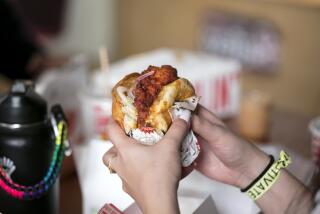Chew on this: Memory helps drive appetite
In a finding that makes clear that appetite is often a case of mind over matter, new research finds that the memory of a hearty recent meal can fill you up. But the memory of a stingy serving of victuals -- even an inaccurate memory -- can make you hungrier, and prompt heavier eating at the next meal, researchers found.
The study, published Wednesday in the journal Public Library of Science One, used an ingenious trick to manipulate research subjects’ memories of a lunchtime meal they had: At the bottom of a soup bowl filled with cream of tomato soup, they installed a hidden pump, which could be used to surreptitiously refill the bowl while the subject ate or draw down its contents.
The researchers wondered whether subjects tricked by such a manipulation would later remember the sight of the hefty 500-mg serving of soup they were asked to eat, or whether they would somehow register the punier 300-mg serving they actually ate. And they wondered whether, as dinnertime approached, the subjects’ appetite would be driven by the actual lunch they had eaten or the more satisfying meal they thought they ate.
When asked how hungry they were as dinnertime approached, subjects’ memories of the meal they saw -- not the one they ate -- seemed to be most influential. Even when their soup bowls were steadily drained, those who were seated in front of a large bowl of soup were less hungry. And those who were presented with a small bowl of soup pronounced themselves more hungry -- even if researchers behind the scenes were steadily refilling their bowls.
The next day, the subjects’ memory of the soup’s ability to satisfy continued to be colored by the memory formed on the previous day: Those who “saw” a big bowl of soup the day before declared a medium-sized bowl of soup likely to fill them up; those who had been presented a small bowl of soup (even one that was furtively refilled) were more likely to say it would not.
The link between mental function and obesity is a complex one, which researchers are just beginning to capture. Neurologists have long known that people whose memories of recent events have been impaired by stroke or injury will often eat one meal after another: Without the memory of a recent meal, they seem inattentive to the hormonal cues that are sending “stop eating, I’m full” messages to the brain.
A study by Kent State University psychology professor John Gunstad recently found that among people who had underwent weight-loss surgery, those with better memory and executive function went on to lose more weight than those with poorer cognitive skills. Finally, researchers have noted that mindless or distracted eating -- the intake of food that might result in a fuzzy memory -- also seems to override the effect of the body’s satiety signals.
A 2006 study found that when people ate what was described as a “meal,” they consumed fewer calories at the next meal than people who were given the same amount of food described as a “snack.”
Our beliefs about the food we eat -- and our ability to remember what we eat and how much we eat -- appears to influence our eating behavior powerfully when we eat again. Too much distraction, too little attention, food presentation -- such as large dishes that distort our assessment of portion size -- can play havoc with our food memories. And eventually, this study suggests, with our waistlines.
Read more about food manipulation and intake in this article:
Mellow setting puts fast food consumers in a mood to ... eat less






